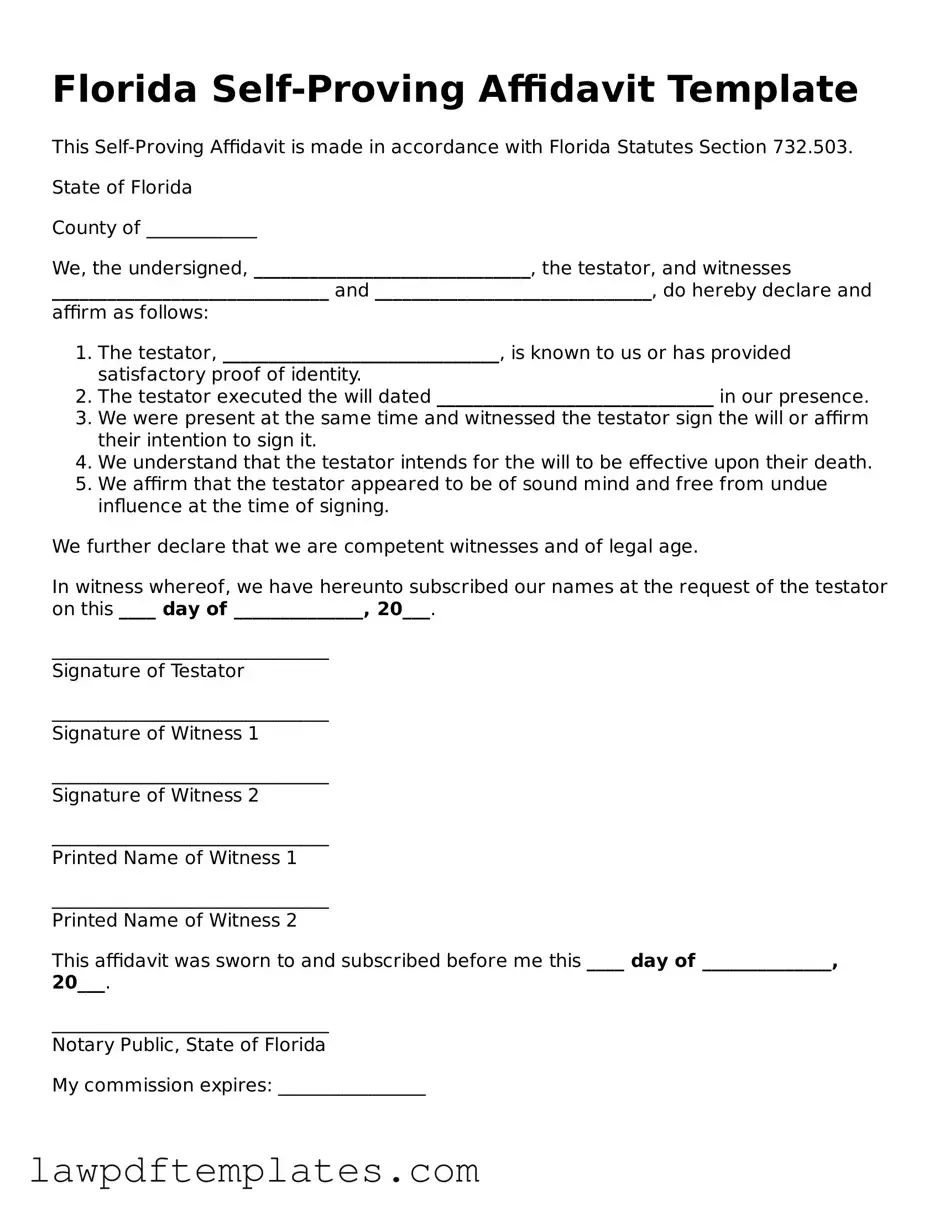Free Self-Proving Affidavit Template for the State of Florida
Form Breakdown
| Fact Name | Description |
|---|---|
| Definition | The Florida Self-Proving Affidavit is a legal document that allows a will to be validated without the need for witnesses to testify in court. |
| Governing Law | This affidavit is governed by Florida Statutes, specifically Section 732.503. |
| Purpose | The primary purpose of the affidavit is to simplify the probate process by confirming the authenticity of the will. |
| Execution | The affidavit must be signed by the testator and two witnesses in the presence of a notary public. |
| Notarization | A notary public must acknowledge the signatures on the affidavit to validate it legally. |
| Inclusion in Will | The self-proving affidavit is typically attached to the will at the time of execution. |
| Revocation | Filing a new will or a revocation document can invalidate a previously executed self-proving affidavit. |
| Benefits | Using a self-proving affidavit can expedite the probate process and reduce court costs. |
| Validity Period | The self-proving affidavit remains valid indefinitely as long as the will is valid. |
| State-Specific | Florida is one of the states that allows self-proving affidavits, making it easier for residents to manage their estate planning. |
Sample - Florida Self-Proving Affidavit Form
Florida Self-Proving Affidavit Template
This Self-Proving Affidavit is made in accordance with Florida Statutes Section 732.503.
State of Florida
County of ____________
We, the undersigned, ______________________________, the testator, and witnesses ______________________________ and ______________________________, do hereby declare and affirm as follows:
- The testator, ______________________________, is known to us or has provided satisfactory proof of identity.
- The testator executed the will dated ______________________________ in our presence.
- We were present at the same time and witnessed the testator sign the will or affirm their intention to sign it.
- We understand that the testator intends for the will to be effective upon their death.
- We affirm that the testator appeared to be of sound mind and free from undue influence at the time of signing.
We further declare that we are competent witnesses and of legal age.
In witness whereof, we have hereunto subscribed our names at the request of the testator on this ____ day of ______________, 20___.
______________________________
Signature of Testator
______________________________
Signature of Witness 1
______________________________
Signature of Witness 2
______________________________
Printed Name of Witness 1
______________________________
Printed Name of Witness 2
This affidavit was sworn to and subscribed before me this ____ day of ______________, 20___.
______________________________
Notary Public, State of Florida
My commission expires: ________________
Common mistakes
Filling out the Florida Self-Proving Affidavit form can be a straightforward process, but several common mistakes can lead to complications. One frequent error is failing to ensure that all required fields are completed. Each section of the form must be filled out accurately. Omitting information can result in delays or even rejection of the affidavit.
Another mistake is not having the affidavit signed in the presence of a notary public. The law requires that the signatures of the testator and witnesses be notarized. If this step is overlooked, the affidavit may not hold up in court, which could undermine the validity of the will.
Individuals often neglect to include the date of signing. This detail is crucial as it establishes when the affidavit was executed. Without a date, questions may arise regarding the timing of the will's creation and its subsequent validity.
Additionally, some people mistakenly believe that the form does not require witnesses. In Florida, two witnesses must sign the affidavit along with the testator. Failing to secure the necessary signatures can invalidate the affidavit.
Another common oversight is using outdated versions of the form. Laws and requirements can change, so it is important to ensure that the most current version of the Self-Proving Affidavit is being used. Using an outdated form may lead to compliance issues.
Moreover, individuals sometimes misunderstand the purpose of the affidavit. It is meant to streamline the probate process by proving the validity of the will without requiring witnesses to appear in court. Misinterpreting this function can lead to unnecessary complications.
Finally, some people may not review the completed form for accuracy before submission. Simple mistakes, such as misspellings or incorrect information, can cause significant issues later on. Taking the time to review the document can help ensure that it meets all legal requirements.
Discover More Self-Proving Affidavit Templates for Specific States
How to Make Affidavit - The Self-Proving Affidavit can expedite court proceedings by proving a will is genuine.
Self-proving Affidavit - The inclusion of a notary's verification can instill confidence in the will's legitimacy among heirs.
To ensure a seamless transaction, it is advisable for both buyers and sellers to familiarize themselves with the details of the Texas Real Estate Purchase Agreement, which can be conveniently accessed through resources such as PDF Documents Hub, providing a comprehensive guide to the necessary documentation involved.
How to Write a Will in Massachusetts - Self-Proving Affidavits can strengthen wills by adding a layer of verification.
